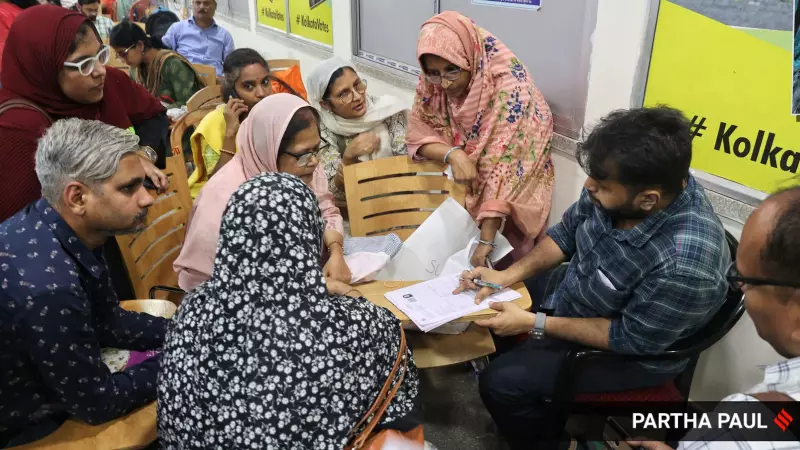
Bengal's Democratic Crisis: How SIR is Fueling Voter Anxiety
The Special Intensive Revision (SIR) of electoral rolls in West Bengal has transformed from a routine administrative exercise into a full-blown social crisis that has gripped the state with fear and uncertainty. What began as a technical process to clean up voter lists has now triggered widespread panic among the state's 7.66 crore voters, leading to tragic consequences and massive political backlash.
Two reported suicides linked to documentation fears have highlighted the human cost of this exercise, while Chief Minister Mamata Banerjee has taken to the streets in protest, accusing the authorities of "a deliberate attempt to erase identities." The political establishment across parties has expressed serious concerns, with even the Left parties registering their reservations with the Election Commission despite not outright opposing the process.
Public Panic Reaches Breaking Point
The scale of public anxiety has reached staggering proportions, evident in both digital and physical spaces. Official data reveals that over one crore people visited the Election Commission's website in just four days to verify their names against the 2002 voter list. Meanwhile, long queues snake around municipal offices, archives, and government departments as citizens desperately search for decades-old records to prove their citizenship and voting rights.
This massive public response stands in stark contrast to the last SIR exercise conducted in 2002, which proceeded with far less commotion despite removing nearly 69 lakh names from electoral rolls. The critical differences lie in the implementation approach and timeline constraints that have created the current crisis situation.
The 2002 Comparison: What's Different Now?
When SIR was conducted in 2002 with full cooperation from the then Left Front government, the exercise spanned two years, giving citizens ample time to gather necessary documents. Simple and accessible proofs like ration cards and voter IDs were accepted, and the responsibility for verification rested with the state and Election Commission rather than individual voters.
The current SIR reverses this citizen-friendly approach dramatically. Voters now face a tight six-week deadline in a state that has grown from 4.58 crore voters in 2002 to 7.66 crore today. The burden of proof has shifted entirely to citizens, with 2002 arbitrarily designated as the "base year" and complex documentation requirements creating insurmountable barriers for many.
The Aadhaar Paradox and Documentation Dilemma
The Election Commission's stance on Aadhaar has created significant confusion and controversy. Despite Aadhaar covering 1.39 billion Indians and being routinely accepted for banking, welfare, and taxation purposes, the Commission insists that Aadhaar "does not establish citizenship." This position appears arbitrary when none of the 11 alternative documents accepted by the Commission—such as utility bills or rent receipts—actually prove citizenship either.
Statistical evidence further undermines claims that West Bengal suffers from exceptional document forgery problems. The state accounts for 7.55% of India's population and holds 7.41% of Aadhaar cards, 7.77% of voter IDs, and 7.46% of ration cards nationally—percentages that align almost perfectly with its demographic weight.
Disproportionate Impact on Vulnerable Communities
The human cost of the SIR exercise is already visible from the Bihar experience, where similar implementation created severe problems for marginalized communities. The case of Munni Devi, a 50-year-old Dalit woman who found her name missing from the 2025 voter list despite being listed in 2020, illustrates how the poor, migrants, and disadvantaged groups bear the brunt of such technical exercises.
In Bihar, the gender imbalance in voter lists widened significantly after SIR implementation, with 15 of 38 districts recording drops in female-to-male ratios. West Champaran recorded just 872 women per 1,000 men in voter lists, indicating systematic exclusion of women voters.
Women's organizations in Bengal warn that similar patterns could emerge, as most midday meal workers and domestic workers—overwhelmingly women—lack the required documents. Structural barriers including neglected birth registrations for girls, early marriages preventing school certificate acquisition, and name mismatches after marriage create compounded disadvantages.
Political Implications and Democratic Concerns
The controversy extends beyond technical documentation issues to fundamental questions about democratic participation. Critics argue that the Commission's rejection of widely available identity proofs will disproportionately harm the poor, minorities, tribal communities, refugees, and the Matua population.
Trinamool MP Mamatabala Thakur highlights that at least 1.5 crore Matuas—a refugee community with long-pending citizenship claims—could face disenfranchisement through this process. The arbitrary designation of 2002 as the base year raises constitutional questions about the legitimacy of elections and governments formed since 2004.
The fundamental fear driving public anxiety is not merely about documentation technicalities but about the systematic narrowing of democratic participation, where marginalized communities are pushed out of the political process under bureaucratic pretexts. As West Bengal grapples with this crisis, the very essence of democratic representation and inclusive citizenship hangs in the balance.






